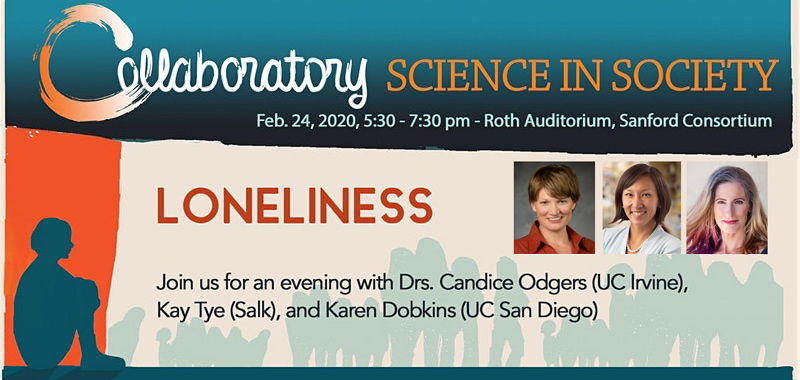Feb 24, 2020–Feb 24, 2020 from 5:30pm–7:30pm
Collaboratory Science in Society: LONELINESS

LONELINESS
Join us for an evening with Drs. Candice Odgers (UC Irvine), Kay Tye (Salk), and Karen Dobkins (UC San Diego)
ALL THE LONELY PEOPLE, WHERE DO THEY ALL COME FROM?
If you imagined Seniors, think again. According to recent studies, Gen Z and Millennials are the loneliest. Loneliness is now described as an epidemic. And not just here – The United Kingdom now has a Minister for Loneliness.
Social species don’t do well in solitary, and you can be alone in a crowd.
This applies to fruit flies, mice, and monkeys.
And they don’t have smartphones.
Is loneliness different from social isolation? Or solitude? Scientists are now proposing a pill for loneliness. But perhaps there is a simpler solution: The rekindling of communities.
Perhaps we have lost touch.
To explore these and other aspects of our contemporary lack and longing, join us for a Collaboratory conversation on loneliness, part of the Science in Society series.
Only connect.
Register at: https://scienceinsocietyloneliness.eventbrite.com
ABOUT THE SPEAKERS:
ABOUT THE SPEAKERS:
Candice Odgers is a Professor of Psychological Science at the University of California Irvine. She is also a Research Professor at Duke University. In 2015 she was awarded the Distinguished Contributions to Psychology in the Public Interest Early Career Award and, in 2016, the Jacobs Foundation Advanced Research Fellowship. Her research focuses on how social inequalities and early adversity influence children’s future health and well-being, with an emphasis on how new technologies, including mobile phones and web-based tools, can be used to understand and improve the lives of young people. Recently, she was an author on a paper exploring the situation of lonely young adults in modern Britain and has also been extensively consulted on the underpinnings and implications of our response to smartphones and social media in general. As she wrote in a recent Comment in the journal Nature: “...studies so far do not support fears that digital devices are driving the downfall of a generation. What online activities might be doing, however, is reflecting and even worsening existing vulnerabilities.”
Kay Tye is a neuroscientist, a Professor and the Wylie Vale Chair in the Systems Neurobiology Laboratory at the Salk Institute for Biological Studies. A recipient of the Society for Neuroscience (SFN) Young Investigator Award, Technology Review's Top 35 Innovators Under 35 award, and the NIH Director's New Innovator Award, her research has focused on using optogenetics to identify connections in the brain that are involved in innate emotion, motivation and social behaviors. Some of her recent work has explored the role of neurons in an area of the mouse brain called the Dorsal Raphe Nucleus (DRN) that apparently represent the feelings of social isolation.”To our knowledge”, Tye explained, this is the first time anyone has pinned down a loneliness-like state in a cellular substrate.” UCLA neuroscientist Alcino Silva commented: ” There is something poetic and fascinating about the idea that modern neuroscience tools have allowed us to reach to the very depths of the human soul, and that in this search we have discovered that even the most human of emotions, loneliness, is shared in some recognizable form with even one of our distant mammalian relatives — the mouse.”
Karen Dobkins is a Professor of Psychology at the University of California San Diego. Although her main area of study has long been perceptual and brain development in children, she has more recently developed a new research passion in the area of Mindfulness and mental well-being. She is active in designing daycare centers in Europe, which aim to enhance mental well-being for children, through carefully chosen designs, installations and mindful pedagogy. She has also created and led Mindfulness workshops at UCSD, in San Diego and around the world, and teaches an exercise class called “IntenSati”, which blends high intensity aerobics with call and response positive affirmations. Complementing the Mindfulness work she is exploring romantic and non-romantic relationships: how people view them, and what people expect from them. Her most recent paper (with Andrew Arnold and Piotr Winkielman) dealt with ‘Interoception and Social Connection’ and explored the potential of mindfulness-based meditation for alleviating loneliness.
With Roger Bingham (Collaboratory Director). Sponsored by the Institute for Neural Computation (INC).
Questions: Please contact Stephanie Corneil, scorneil@ucsd.edu.
Made possible by generous funding from the UC San Diego Office of the Chancellor (Dr. Pradeep Khosla), UC San Diego Academic Affairs (Executive Vice Chancellor Dr. Elizabeth H. Simmons), the Legler Benbough Foundation (Peter Ellsworth); Koret Foundation (UC President Emeritus Richard C. Atkinson); Learning How To Learn (Dr. Terrence Sejnowski); UC San Diego Research Affairs (Dr. Sandra Brown) and Vice Chancellor of Health Sciences (Drs. David Brenner and Douglas Ziedonis); and Kavli Institute for Brain & Mind (KIBM - Dr. Nicholas Spitzer).
Brain image and logo by Marley Rossa
Date and Time
Feb 24, 2020–Feb 24, 2020
from 5:30pm–7:30pm
Location
Roth Auditorium, Sanford Consortium for Regenerative Medicine
Event Registration
Registration for this event is required
by .
Visit the registration page for details.
Event Fee
Free
Contact
Stephanie Corneil • scorneil@ucsd.edu
Audience
Faculty, Staff, Students, The General Public
Event Host
The INC Collaboratory